Launching a scathing attack on Prime inister Narendra Modi over his indifference in the matter of India-China border relations, Congress President Mallikarjun Kharge on Thursday accused him of 'sleeping after taking opium' at a time when China was 'entering' into Indian territory.
The Congress supremo's remarks came days after China further renamed thirty places along the Line of Actual Control (LAC) in India's northeastern state of Arunachal Pradesh.
What all did Kharge say?
Duing his election rally in Rajasthan's Chittorgarh, Kharge said, "Modi says 'I have a 56-inch chest, I will not be scared'. If you are not afraid, then why have you left a large part of our land for China? They are coming inside and you are sleeping. Have you taken sleeping pills? Have they taken opium from the fields of Rajasthan... and fed you?"
Furthermore in his verbal attack, the Congress president also called PM Modi a "sardar (chief) of liars" and condemned him for focusing on vilifying the Gandhi family.
"He does not think for the country, he just abuses the Gandhi family. He wants to take the people of the country with him by torturing them. He always keeps lying. Modi is 'sardar of liars'," he said.
China's bid to rename Arunachal Pradesh
Including twelve mountains, four rivers, one lake, one mountain pass, 11 residential areas and a piece of land renamed by China, their Ministry of Civil Affairs had recently published a fourth list of 'standardised' geographical names for Zangnan, the Chinese name for Arunachal Pradesh.
However, India firmly rejected the development terming it as 'senseless' while asserting that investing new names for the place won't alter the reality that Arunachal Pradesh "is, has been, and will always be" an integral part of India.
"China has persisted with its senseless attempts to rename places in the Indian state of Arunachal Pradesh. We firmly reject such attempts," Ministry of External Affairs (MEA) spokesperson Randhir Jaiswal said.
"Assigning invented names will not alter the reality that Arunachal Pradesh is, has been, and will always be an integral and inalienable part of India," he added.




























